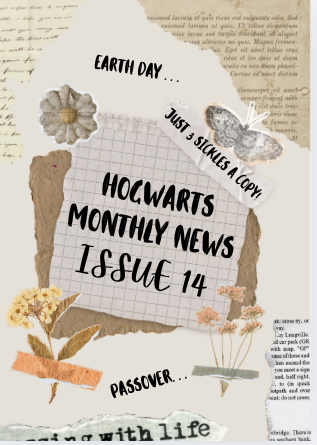Hogwarts Monthly News (Issue 14)
By Hazel Emory Antler
. . . Hey lovelies! Welcome back to another issue of Hogwarts Monthly News. April has been chill, relaxing, and quite peaceful, but many celebrations have occured! April Fools, Easter, and ANZAC Day are just a couple. Of course, we have had a couple of custom chapters made this month too, but I won't spoil anything else. Flip to the first page! (One copy = 3 sickles.)
Last Updated
May 3, 2025
Chapters
20
Reads
142
Passover
Chapter 6
Every spring, usually around April, Jewish families across the world come together for a holiday that feels like part dinner party, part history lesson, and part spiritual reflection. It’s called Passover, and it’s one of the oldest and most meaningful traditions in Judaism. Read on!
Passover goes all the way back to ancient Egypt, according to the Torah. The story begins with the Israelites living under Pharaoh’s rule, enslaved and oppressed for generations. Then comes Moses, who has been chosen by God to lead them out. Pharaoh refuses to let them go, again and again, and every time he says no, a new plague hits Egypt. There are ten in total, and they become pretty intense, some of which include rivers turning to blood, frogs everywhere, and darkness that covers everything. The final plague, the death of every Egyptian firstborn, is the one that finally pushes Pharaoh to let them leave.
But before that last plague hits, the Israelites are told to mark their doorposts with lamb’s blood so that the angel of death will pass over their homes. That’s where the holiday gets its name.
Once they’re allowed to leave, the Israelites take off in a rush, so fast that their bread doesn’t have time to rise. That’s why, during Passover, Jews eat matzah, a simple, flat bread that’s more like a cracker. It’s not about taste, but it’s about remembering. That moment, the panic, the urgency, the hope, is baked into every bite.
Whether you see the story as a historical fact or a powerful metaphor, its message still resonates: oppression can end, change is possible, and freedom is something to be cherished.
Passover lasts for eight days, but the highlight is the Seder, a special meal held on the first night or two. It’s not just dinner, it’s a ritual. The meal follows a specific structure, guided by a book called the Haggadah, which includes prayers, songs, questions, and storytelling.
At the centre of the table is the Seder plate, which holds symbolic foods that help tell the Exodus story. There are bitter herbs to remind us of the pain of slavery, sweet charoset to represent the mortar used by enslaved workers, parsley dipped in salt water to recall tears, a roasted shank bone to symbolize the ancient sacrifice, and a roasted egg for mourning and renewal. Every item has a meaning, and every part of the meal is a chance to reflect.
One of the most well-known parts of the Seder is when the youngest person at the table asks, “Why is this night different from all other nights?” It’s more than just tradition, it’s about engaging with the story, asking questions, and making sure the next generation doesn’t just hear the story but understands it.
During the week of Passover, observant Jews avoid chametz, which means anything made with leavened grains. That rules out bread, pasta, beer, and most baked goods. Instead, it’s matzah and specially prepared foods. Some people go all-in with strict dietary rules; others focus more on the spirit of the holiday. Like many Jewish observances, there’s room for variation, and a lot of personal meaning.
Even after thousands of years, Passover still feels relevant. It’s a holiday built around questions, storytelling, and remembering where we came from, not just as individuals, but as a people. It reminds us that freedom can’t be taken for granted, and it also encourages us to see ourselves in the story.
Beyond the rituals and rules, Passover is also about gathering. It’s about the warmth of family and friends around a table, sharing food and stories and laughter (and probably a few disagreements). It’s about connecting across generations. For many people, it’s a mix of tradition and adaptation, and ancient customs passed down through modern lives.
Whether it’s your first Seder or your fiftieth, whether you stick to every tradition or just dip your toes in, Passover offers a chance to slow down, ask big questions, and celebrate what freedom means, not just in history, but right now.
Written by Michael I.
Edited by Hazel Antler.
Proofread by Daphne Clarke.



